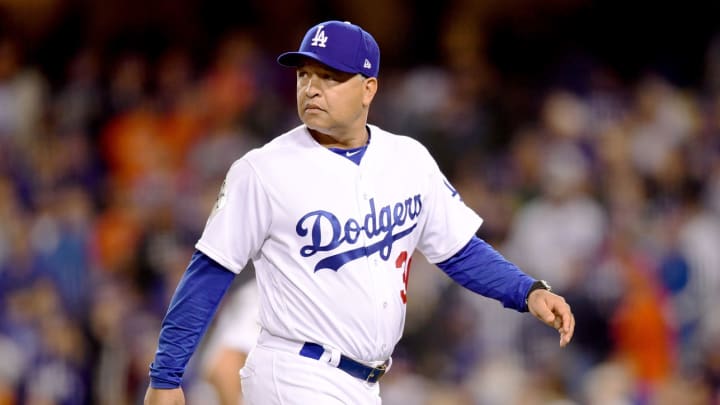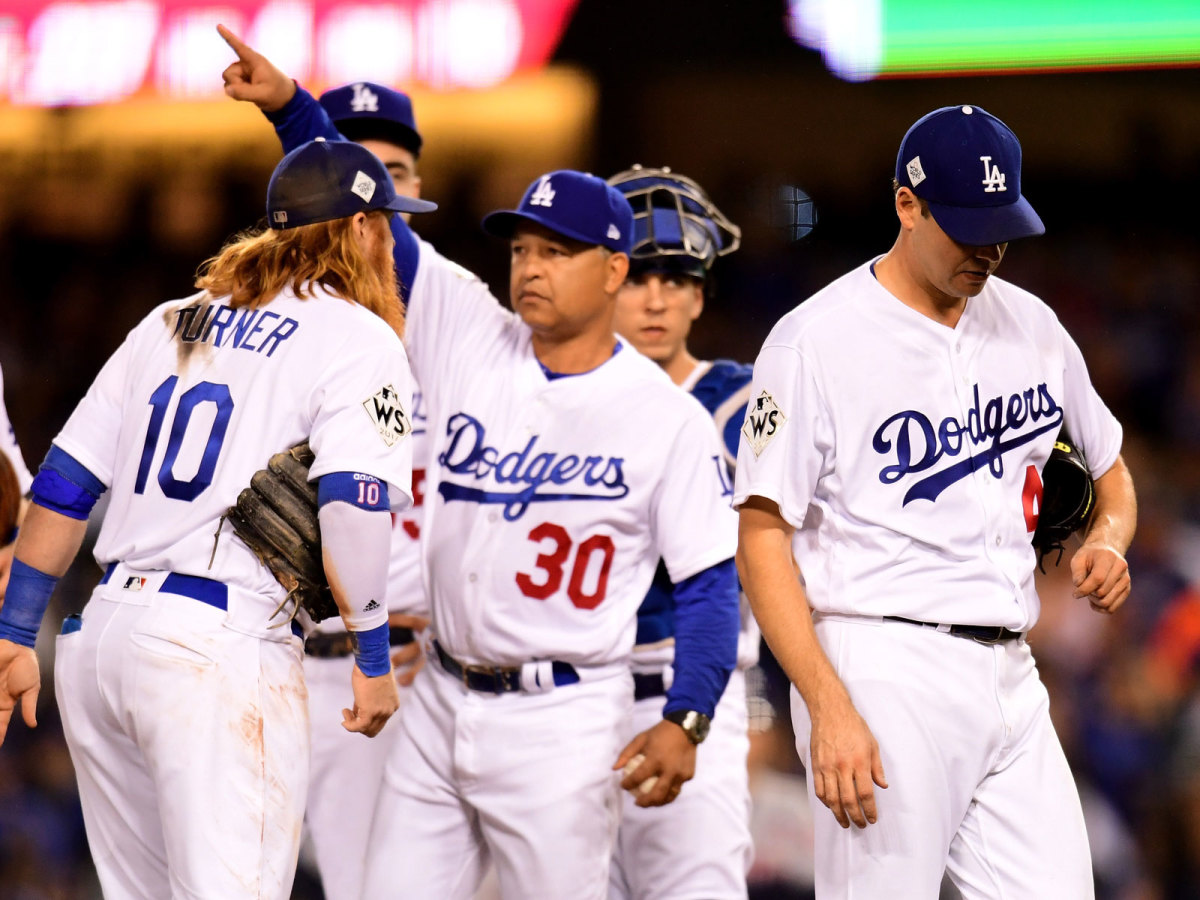As World Series Game 7 Nears, the Dodgers and Astros Are Perfecting the Art of Managing

In a World Series that has challenged players and spectators alike to accept the events unfolding before their eyes as real, Tuesday night’s Game 6 at Dodger Stadium offered a chance, however fleeting, to appreciate the more strategic aspects of the game and give the home run sprees and improbable lead changes Halloween off.
This 113th World Series, in addition to featuring baseball’s two best teams—a claim that players on both squads repeated following the Dodgers 3–1 win in Game 6—has co-starred two of the game’s most observant and intelligent managers; and just offstage, two of its most influential analytics departments. Tuesday night, in the battle for decision-making power that pits Gut against Numbers, the shot-caller that lives behind Dave Roberts’ and A.J. Hinch’s ribs prevailed again.
Roberts, who is sometimes portrayed as an automaton, mindlessly executing what the quants in the Dodgers’ front office tell him to, confirmed afterward, “It’s been more gut than information. And eyes. I want to put eyes with my gut.” The input he receives from staffers like Dan Cervone, the Harvard Ph.D. who serves as the Dodgers’ Senior Analyst in Research and Development, has its value, but in a series as unpredictable as this one (“Intense is the word,” said Roberts) the ol’ intestines can be a hard thing to overrule.
The Dodgers Overcame Justin Verlander's "Unicorn" Fastball to Force World Series Game 7
“We can go in with all the information that we want,” said Astros manager A.J. Hinch, whose team employs a former NASA engineer as its “director of decision sciences,” “but there is also an element of paying attention to what your players are doing and how they're playing … It's a people business.”
To wit, hours before the game, Roberts finalized the lineup that would face Houston’s nearly unhittable righthanded starter, Justin Verlander, by penciling in the righthanded bat of Logan Forsythe at second base over the intuitive choice, lefthanded hitting Chase Utley. That decision came “because of my gut,” Roberts said. “The at-bats that [Forsythe] has taken all throughout the postseason, regardless of handedness, I liked the quality of them.” It didn’t bear fruit offensively, but that move gave Roberts the option of pinch-hitting Utley later in the game, “in the pitcher’s spot, which we did.”
In the fifth, Utley scored what would prove to be the game-winning run.
Roberts told reporters before the game that he’d “love to see [Dodgers starter Rich Hill] throw a complete game.” But trailing 1–0 in the top of the fifth, he pulled Hill, who had thrown just 58 pitches, and replaced him with Brandon Morrow—victim of a cringeworthy, six-pitch, four-run artillery barrage in Game 5.

“For me, I just felt that in that one particular spot Brandon gave us the best chance to get out the hitter, [Alex] Bregman. So that was kind of my gut.” Bregman, who had clouted home runs against power pitchers Clayton Kershaw and Kenley Jansen in this series, grounded a 99 mile-an-hour Morrow fastball to shortstop to end the inning.
Roberts shoved all his chips onto the betting square labeled HUNCH and let Morrow stay in for the sixth to face the Astros’ second, third and fourth hitters. Jose Altuve grounded out and Carlos Correa struck out before Yuli Gurriel, who has steadfastly refused to let fastballs in the strike zone pass him in this series, lined a 99 mph one into center for a single. Roberts promptly replaced Morrow with lefty Tony Watson, who hit Brian McCann—Two on, two out, hang in there, Gut—then delivered a changeup that Marwin Gonzalez lined up the middle. Enter the Dodgers’ analytics team, whose calculations had positioned Utley right behind second base, where he caught Gonzalez’s screamer to end that inning.
Rich Hill’s choice to walk off the mound so that L.A. fans’ booing of Gurriel (for his ethnically insensitive gesture in the dugout in Game 2) could last longer? That was as non-analytic as Hinch’s choice in the seventh to pinch hit for Verlander, who’d thrown only 93 pitches and still looked strong. “We only had 9 outs left, and we were down. It was no more complicated than that.”
There wasn’t much quant influence, if any, on the opposite field homer from Joc Pederson put the Dodgers up 3–1, nor on Pederson’s skipping, chest-punching trot around the bases, a bit of performance art that would have made Lin-Manuel Miranda and Mikhail Baryshnikov equally proud. “You kind of black out in a situation like that,” Pederson explained. “A lot of emotions hit me quickly.”
The Astros Will be the 2017 World Series Champions
When “California Love” came throbbing from the tower of outfield speakers and Dodgers closer Kenley Jansen set about finishing the Astros off, the data crunchers might as well have shut down their laptops. There wasn’t much talk of slick balls or wayward sliders on this night. There was only the 6’ 5”, 260-pound Jansen force-feeding the Astros a menu of cruel mid-90s cutters, over two innings, until the visitors were out of outs.
Baseball analytics work best over time. Namely, the 162-game ultramarathon that comprises the regular season. (Or as Billy Beane put it in Michael Lewis’ Moneyball, “My s--- doesn’t work in the playoffs. My job is to get us in the playoffs. What happens after that is f---ing luck.”) Game 6 was one for the instinctive, the spontaneous. The whole series has been.
Is there any reason to believe that the first Game 7 in Dodgers history will be different?
